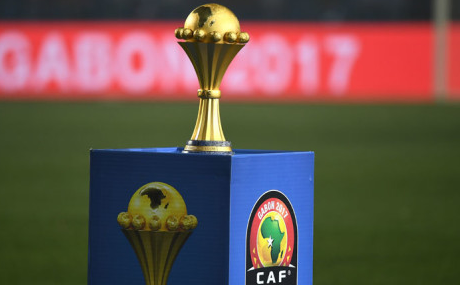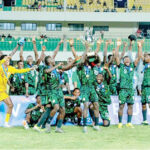Another episode of shattered hope came on Wednesday, September 28, 2023, as Nigeria failed in its joint bid with the Republic of Benin to host the 2025 Africa Cup of Nations (AFCON). The Confederation of African Football (CAF) announced Morocco as the host. Nigeria also lost in its bid to host the 2027 edition as CAF named Kenya, Uganda and Tanzania as joint hosts.
Nigeria hosted the 12th edition of AFCON in 1980. It then co-hosted the 22nd edition with Ghana in 2000. With Morocco already ahead in terms of organisation and facilities for the 2025 edition, the joint bid by Nigeria and the Republic of Benin, which had loomed to the forefront in the race to host the 36th edition in 2027, fell like a pack of cards.
Nigeria had put forward the MKO Abiola Stadium in Abuja and the seven others located in Port Harcourt, Uyo, Lagos, Kaduna, Asaba, Benin City and Kano as venues to host the matches. For the Republic of Benin, two stadia located in Cotonou and Porto Novo were listed.
Yet, of all the eight presented by Nigeria, only one is fit for international matches; others are in various deplorable states. But CAF was looking for nations that would provide first-class facilities without last-minute rushes or postponements. This is because AFCON has, for 10 years, suffered either a shift in timing or a change of hosts.
- FG urged to incorporate ethics, anti-corruption studies into university curriculum
- Luca leading the charge at Blue Label Challenge
For example, the 2013 edition, which originally was allocated to Libya, had to move to South Africa because of the violence there. The same applied to the 2019 edition, which moved from Cameroon to Egypt, and the 2021 edition, which moved from Cote d’Ivoire to Cameroon the following year.
The 2023 allocated to Cote d’Ivoire was shifted to 2024. Guinea was originally selected to host the 2025 finals, but the Guineans fell behind badly in the preparations, with infrastructure and other facilities unattended.
And in 1996, Kenya was awarded the hosting rights but was stripped because of poor preparations, with South Africa getting the nod to host the continent instead. Morocco impressed CAF with its organisational ability coupled with its already-working facilities. Moreover, the kingdom was already preparing its facilities to boost its chance of co-hosting the 2030 World Cup with Portugal and Spain.
To showcase its readiness, last February, Morocco welcomed several African journalists on a “media tour” to highlight its infrastructure and organisational capabilities to host the 2025 tournament.
For Nigeria, six months ago, it hosted a CAF four-man inspection team for the eight stadia and related facilities. They made not-so-satisfactory observations and visited other facilities undergoing extensive renovations, like the Teslim Balogun Stadium.
Nigerians were largely left in the dark about the bid. It looked like a closed move by some top Nigerian government and Nigeria Football Federation (NFF) officials until the announcement of the bid loss. There was no national mobilization. Maybe the officials feared that Nigerians would question the benefits of hosting continental tournaments.
And for good reasons: Ordinarily, hosting such sporting events helps develop a nation’s sports infrastructure, but Nigeria has become a graveyard of such facilities once the events end.
How many Nigerians would be proud of the state of the facilities used in hosting the 1980 and 2000 African Cup of Nations, the 1989 African Championships in Athletics, the 2003 All-Africa Games, and the 2009 FIFA U-17 World Cup? They have all been left to rot away due to a lack of proper maintenance.
Instead of using such hosting to bolster sporting sector infrastructure, they have largely benefited stakeholders and the well-connected. Immediately after the events are over, maintenance of the infrastructure is abandoned, defeating the benefit that such hosting opens doors for the country’s socio-economic development.
This is because, apart from having functional state-of-the-art stadia, hotels, and other allied infrastructure, such hosting showcases a nation’s security architecture, a good transportation network, and recreational and entertainment facilities.
The inability to maintain high standards and a maintenance culture has put Nigeria in an embarrassing position of losing two successive bids in one day, despite our huge potential.
The loss is symbiotic of the national malaise. Indeed, denying Nigeria the hosting rights is a vote of no confidence and a slap on Nigeria’s image as a sporting nation. This is a time, therefore, for stocktaking in the sporting sector. All stakeholders must show seriousness and ensure that facilities are in good condition at all times. All concerned federal Ministries, Departments and Agencies (MDAs) should show readiness and pool their resources together to maintain these facilities.
Moreover, the Daily Trust calls on the Minister of Sports to see the humiliation of Nigeria by AFCON as evidence of the rot in the sector. He should rise up and clean the Augean stables. Most importantly, the stakeholders should realise that they are hosting the events for the benefit of Nigeria and Nigerians and therefore must get the citizens buy-in before they rush to bid.
Ministry of Sports officials should stop embarrassing Nigeria by bidding for hosting rights based on mere promissory notes that facilities would be ready on time when other bidders are showcasing functional infrastructure. We must get our act together as a country.

 Join Daily Trust WhatsApp Community For Quick Access To News and Happenings Around You.
Join Daily Trust WhatsApp Community For Quick Access To News and Happenings Around You.


